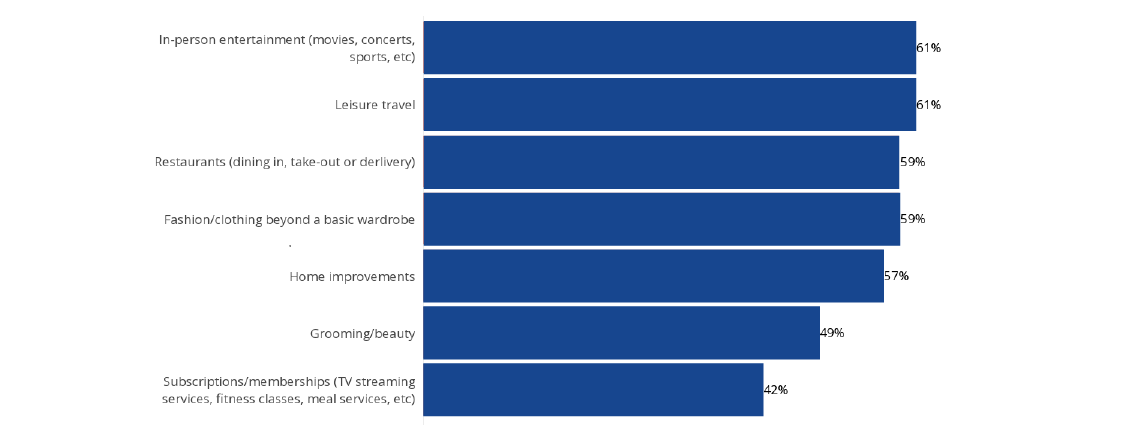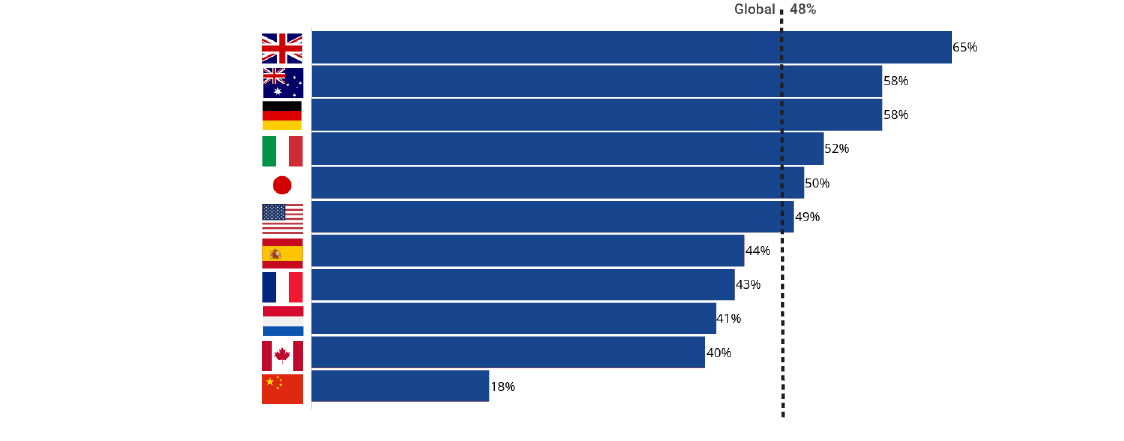Smart Homes for Thrifty Households
13 December 2022
Share with a Friend
All fields required where indicated (*)Faced with higher costs of living, households are employing smart home solutions to become more resilient and cut costs. As the gap between in-home and out-of-home experiences becomes easier to bridge, more saving opportunities emerge. For instance, with a home theater and a restaurant-quality homemade meal, we will likely become more selective about our out-of-home activities, saving them for valuable experiences we cannot do at home (yet).
People are struggling
Last October, big data firm IRI found that nearly three-quarters of European consumers are cutting back spending on everyday items.1 Almost two thirds have cut down on essentials (for example by missing meals or reducing heating), with a third using their personal savings or taking out loans to pay bills.
People are spending less on non-essentials
Compared with the beginning of 2022, % spending less on these "non-essentials"

Source: Dynata Global Consumer Trends, Q3 2022.
Similar findings come from Dynata, which found that about half (53%) of the people in 11 researched countries are (slightly) struggling to afford basic needs, while three quarters (73%) are (slightly) struggling to afford non-essential expenses. As the graph below shows, people are spending less on entertainment, leisure travel, clothes, beauty services and home improvements.2
Doing more at home can provide significant cost savings for thrifty households. In our June blog, we described how households have been installing smart home solutions – such as solar panels, energy management systems and heat pumps – to lower their cost of living. While energy is one of the most significant areas for saving money (see graph), now people are also exploring other options.
People are struggling to pay their energy bills
% Struggling to afford energy/utilities now

Source: Dynabyte Global Consumer Trens, Q3 2022.
People are creating new moments in home
Moreover, these home-based behaviors are increasingly becoming a good alternative for the conventional way of doing things. IRI1 notes that people are creating new occasions and moments for familiar everyday products, such as packed lunches at work and specialty coffees or pre-mixed drinks at home.
Instead of eating out or ordering in, people preparing more meals at home to save money. Smart home solutions, such as meal kit delivery services, recipe apps, or streamed cooking content (e.g. Cheflix) can make it easier to create restaurant-style meals at home. In addition, more can be saved by reducing food waste, an area that several smart fridges are already helping with by checking expiry dates.
Our homes offer a valuable alternative
Normally during recessions, people do not stop doing things altogether; instead they look for cheaper alternatives or go out less often. In the past, they would go to the movies instead of a concert. Today, they might prefer to play the newest games or watch popular films on the home entertainment system. With an implied cost per hour of $0.49, video games or streaming are less expensive than movie theaters ($5), theme parks ($12.50), sports events ($16.67), or concerts ($33.33).3
Some experiences, however, are still best experienced in real life. For instance, the experience gap between a real concert and a virtual one is still significant. The question is, though, will that remain the case? While the global live-music industry has seen a 5% compound annual growth rate in 2022 – on par with the growth between 2007 and 20194 and despite several high-profile cancellations – not everybody will be able to pay out an average $108 per ticket5.
This makes a reasonable case for virtual concerts, and several artists (including Ariana Grande, Justin Bieber, and Marshmello) are already experimenting with it.6
The examples from food, drink and entertainment show that our homes can offer a valuable alternative in the relative choices we have to make when deciding where to spend our money. This does not mean we will no longer go out, but by doing more in the home, and making full use of the technology inside it, we can become more resilient to deal with the tough times ahead.
1 https://www.iriworldwide.com/nl-nl/insights/news/demand-signals-2
2 Dynata Global Consumer Trends – Staying ahead of the downturn Q3 2022
3 Bernstein, US Media Roadshow, May 2018
4 https://www.billboard.com/pro/touring-recession-music-fans-buy-concert-tickets/
5 https://news.pollstar.com/2022/06/24/concert-industry-roars-back-pollstar-2022-mid-year-report/
6 https://www.hypebot.com/hypebot/2022/11/10-superstars-that-have-performed-in-the-metaverse.html
Informations importantes
À des fins d’information et de publicité uniquement.
Ces informations proviennent de VanEck (Europe) GmbH qui a été désignée comme distributeur des produits VanEck en Europe par la société de gestion VanEck Asset Management B.V., de droit néerlandais et enregistrée auprès de l’Autorité néerlandaise des marchés financiers (AFM). VanEck (Europe) GmbH, dont le siège social est situé Kreuznacher Str. 30, 60486 Francfort, Allemagne, est un prestataire de services financiers réglementé par l’Autorité fédérale de surveillance financière en Allemagne (BaFin). Les informations sont uniquement destinées à fournir des informations générales et préliminaires aux investisseurs et ne doivent pas être interprétées comme des conseils d’investissement, juridiques ou fiscaux. VanEck (Europe) GmbH et ses sociétés associées et affiliées (ensemble « VanEck ») n’assument aucune responsabilité en ce qui concerne toute décision d’investissement, de cession ou de rétention prise par l’investisseur sur la base de ces informations. Les points de vue et opinions exprimés sont ceux du ou des auteurs, mais pas nécessairement ceux de VanEck. Les avis sont à jour à la date de publication et sont susceptibles d’être modifiés en fonction des conditions du marché. Certains énoncés contenus dans les présentes peuvent constituer des projections, des prévisions et d’autres énoncés prospectifs qui ne reflètent pas les résultats réels. Les informations fournies par des sources tierces sont considérées comme fiables et n’ont pas été vérifiées de manière indépendante pour leur exactitude ou leur exhaustivité et ne peuvent être garanties. Tous les indices mentionnés sont des mesures des secteurs et des performances du marché commun. Il n’est pas possible d’investir directement dans un indice.
Toutes les informations sur le rendement sont historiques et ne garantissent pas les résultats futurs. L’investissement est soumis à des risques, y compris la perte possible du capital. Vous devez lire le Prospectus et le DICI avant d’investir.
Aucune partie de ce matériel ne peut être reproduite sous quelque forme que ce soit, ou mentionnée dans toute autre publication, sans l’autorisation écrite expresse de VanEck.
© VanEck (Europe) GmbH
Inscrivez-vous maintenant à notre newsletter
Related Insights
Related Insights
12 mars 2024
09 février 2024
10 avril 2024
12 mars 2024
09 février 2024
16 janvier 2024
08 décembre 2023
